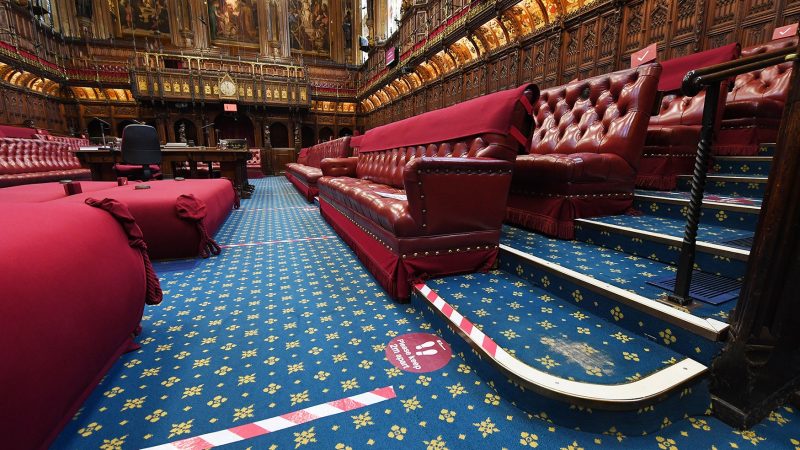
The government has suffered a large defeat in the House of Lords on its internal market bill, with peers voting to reject clauses allowing ministers to break international law and override the EU withdrawal agreement.
After a parliamentary debate today, members in the Lords voted by a majority of 268 against powers in the bill. Peers from all parties expressed concerns about the contents of the proposed legislation.
Labour’s leader in the House of Lords, Baroness Angela Smith, said: “I am sure some in government will initially react with bravado and try to dismiss tonight’s historic votes in the Lords.
“To do so, however, would underestimate the genuine and serious concerns across the UK and beyond about ministers putting themselves above and beyond the rule of law.
“The government should see sense, accept the removal of these offending clauses, and start to rebuild our international reputation.”
The government has already pledged to reinstate any controversial clauses removed by peers, with the Prime Minister’s spokesperson saying he considers the most disputed aspects of the bill to be “a vital safety net”.
A Downing Street spokesperson confirmed following the votes that it was “disappointed” in the result and said: “We will retable these clauses when the bill returns to the Commons.”
Tory peer Gavin Barwell, former chief of staff to Theresa May, voted against the government tonight on the basis that the clauses “damage our reputation for respect for the rule of law”.
Shadow Attorney General Lord Falconer has urged the government to “stop and think” about its controversial bill, and told a Sky News interview that the Tories risked making the UK an “international pariah”.
The Labour peer highlighted the implications that the legislation could have for the country’s relationship with the US, particularly following the election of Joe Biden as President, and the prospects of securing a trade deal.
The bill contains provisions to overwrite sections of the withdrawal agreement signed up to by Boris Johnson and would contravene the Good Friday Agreement. Biden has said a US/UK trade deal is “contingent” on preventing a hard border.
Under the withdrawal agreement, Northern Ireland was set to remain in the single market regardless of whether the wider UK has managed to secure a deal on trade and security with its European allies by the end of the transition period.
But the bill debated this afternoon sought to hand ministers unilateral powers to change or disapply export rules for goods traveling from Britain threatening the Good Friday peace deal, which ended decades of conflict in Northern Ireland.
Biden has previously called Johnson the “physical and emotional clone of Donald Trump”, and concern is growing over the extent of the damage done to the relationship between the US and the UK by the Tory Prime Minister.
Charles Kupchan, senior director for European affairs at the national security council in Barack Obama’s administration and a Biden campaign adviser, told Times Radio this morning that France is now the “go-to partner” for the US.
He said: “Over the last few years, in some ways, the French have replaced the British as the go-to partner, when it comes to the counter-ISIL mission, when it comes to Syria, Iraq, Africa, and that may continue.
“I personally have been quite worried about this, in the sense that I see the US-UK partnership as one that has been extremely important over the last hundred years and I just don’t know that it’s going to be as effective and as consequential as it has been moving forward.”
Labour’s Lisa Nandy warned before the US vote that the Conservative government had “needlessly and repeatedly created tension in the relationship with the Democrats and with the Biden potential administration”.
The Shadow Foreign Secretary highlighted one occasion in particular that saw Johnson claim that President Obama removing a bust of Churchill from his office was seen by some as a sign of an “ancestral dislike of the British Empire”.
The controversial internal market bill passed its third reading in the Commons with a majority of 84 in September, with MPs having voted 340 to 256 in favour of allowing government ministers to break international law.
Environment Secretary George Eustice MP said earlier today that the government would reinstate any clauses removed by the Lords, arguing that the legislation is “not about undermining the Belfast Agreement”.
The Prime Minister’s spokesperson added to journalists in a briefing: “MPs backed the internal market bill by 340 votes to 263 in September, and our position remains that the clauses are a vital safety net.
“We have been clear that as a responsible government we cannot allow the peace process or the UK’s internal markets to inadvertently be compromised by unintended consequences of the protocol.
“Any Lords amendments will be considered when they return to the House of Commons but we do consider these clauses to be a vital safety net.”
After the debate in the Lords, the Commons will need to consider any amendments. The bill is expected to complete its progress through parliament in December with MPs likely to have a final vote just days before the transition period ends.




More from LabourList
‘Tackling poverty should be the legacy of Keir Starmer’s government’
‘The High Court judgment brings more uncertainty for the trans community’
‘There are good and bad businesses. Labour needs to be able to explain the difference’